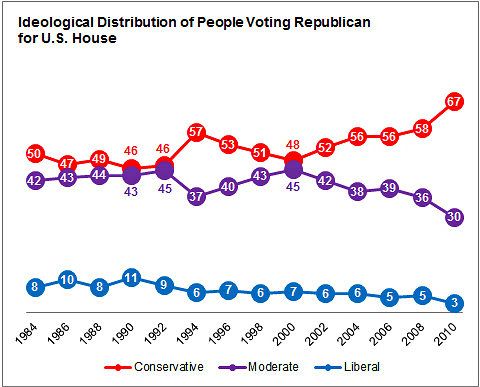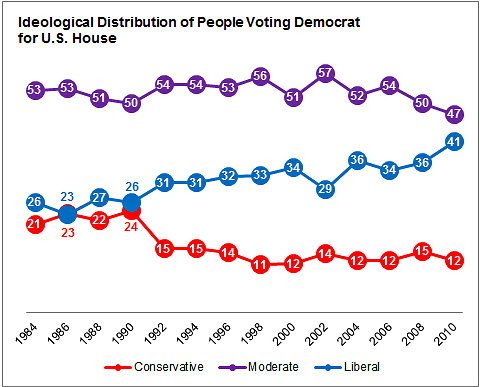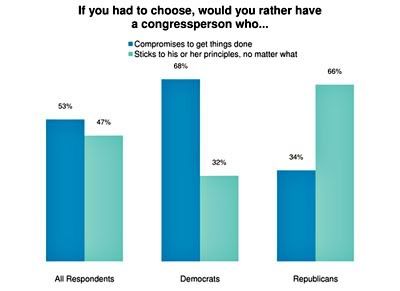
I'm sure this doesn't surprise anyone. We've all witnessed the entire party move rightward. They were able to use the energy created by their volatile base to win pretty handily in the 2010 midterm elections. That has left them dependent on an electorate that will brook no compromise to their ideological positions.
This begs the question then about whether or not the same thing is happening in the Democratic Party. The answer would be "no."

While conservatives make up 2/3 of the Republican Party, liberals are less that 1/2 of the Democratic Party, with moderates maintaining a plurality.
In discussing this, Steve Benen points to a chart flagged by Kevin Drum.

The differences are stark. Democrats are pragmatic and want accomplishments; Republicans are dogmatic and want ideological purity.
Of course, many of us often hear from Democrats who are "dogmatic and want ideological purity." They are clearly not the majority in our party (or the general electorate for that matter).
As Benen summarizes so well:
It’s easy to forget how central the notion of compromise is to the entire American political process. In our system, there’s an expectation that members of a party’s caucus will compromise amongst themselves, leading to another compromise with the opposition caucus, leading to another compromise with the other legislative chamber, leading to another compromise with the executive branch.
Its kinda the way the founders planned it.
Next time you hear a poutrager predict doom and gloom for "Obama the pragmatic compromiser," keep this in mind.




While the difference between the parties is clear I note the Democrats have the same trend, towards more liberalism and less conservativism (i.e. the opposite trend:-)
ReplyDeleteYour second chart is amazing, though. I guess one might conclude that conservatives do not compromise and liberals and moderates do (I know it is strictly speaking not correct, but the numbers fit so nicely:-)
Sophie Amrain
The Democrats who demand ideological purity are, by any analysis, a very small percentage of the overall party. As a number of recently elected Republican governors and state houses are finding out the hard way, the vast majority of their electorate isn't pleased with their unwillingness to bend, and failure to get things done.
ReplyDeleteNorbrook
ReplyDeleteYou're so right about the eventual outcome of either extreme. I'm hoping that both Democrats and Republicans will eventually learn that lesson.